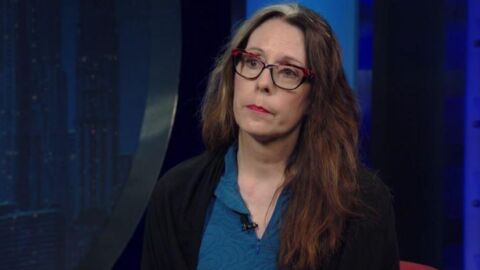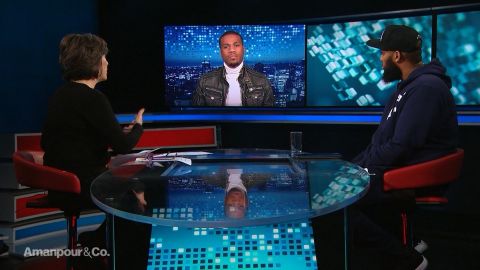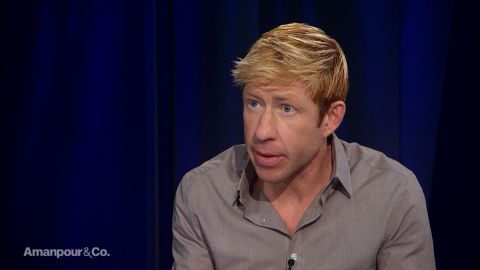Read Transcript EXPAND
CHRISTIANE AMANPOUR: And we now turn to the act of violence that shames so many into silence, and that is sexual abuse. Our next guest says the time to speak up on the matter has long passed. And instead, we must now shout. 20 years ago, the author, Laurie Halse Anderson penned, “Speak.” It was groundbreaking novel confronting rape and it became mandatory reading in classrooms across America. Now, enraged by how little the culture has changed, Anderson is braving her personal experience with sexual abuse in her new memoir, which is called “Shout.” She told our Alicia Menendez why she believes the issue is only getting worse.
ALICIA MENENDEZ: Laurie, thank you so much for joining us.
LAURIE HALSE ANDERSON, AUTHOR, “SHOUT”: I appreciate the opportunity. Thank you.
MENENDEZ: More than 20 years ago you had a dream, some might call it a nightmare, that led you to write your first book “Speak.” Can you tell me about that moment?
ANDERSON: That moment came a few months after I had finally gone into therapy. Because 23 years earlier, when I was 13, I was raped and I didn’t tell anybody about it. And my PTSD and depression had finally gotten to the point where I had no choice, I needed help. And after I started exploring my trauma in — with a therapist, then as a writer, I wanted to explore it in my writing. And this character showed up one night just sobbing in my head and she wound up becoming the Melinda Sordino, the main character in “Speak.”
MENENDEZ: At the time, you didn’t publicly tie the story in “Speak” to your own story. When did you decide to start sharing that publicly?
ANDERSON: When “Speak” came out in 1999 I began to receive invitations to speak at high schools all over the country. And at first, I just thought I was supposed to talk about literary elements. But then listening to students’ questions made me realize I had a responsibility to talk about my experience and to model survivorship. So, it was quite shortly after I started traveling that I began to share my real story. “Speak” is about 10 percent my story. “Shout” is 100 percent.
MENENDEZ: Your new book “Shout” is a poetry memoir about your experience of surviving. For someone who’s not read it, talk me through the structure of the book and why you wanted to write it this way.
ANDERSON: Oh, that’s a great question. The book opens with a poem about my father, who is a veteran from World War II and who developed PTSD after his experience helping to clean up after the Dachau concentration camp. In order to understand my reaction when I was raped, which is keep my mouth shut and not talk, you need to understand the context of my family’s silence around issues of violence and hard conversations. We just didn’t talk about those things. So, that’s a little bit — that sets up what happened to me when I was 13 and then my reactions and how I dealt with that attack very badly, which led to the writing of “Speak” eventually. The second section of the book is everything that I have learned from survivors for over 20 years. How many victims are out there, how powerful each story is. And I let my own rage peep through with suggestions about how to change things. And at the end I circle back to my parents, whom I loved. You know, it’s hard when people die, you still love them, but we have to put that in the past tense, love them so much. And thankfully, they lived long enough we were able to really do some deep loving work at the end of their lives, which has really strengthened me.
MENENDEZ: But why poetry?
ANDERSON: Oh, poetry is what you write when the subject is very important. You want to leave room for the reader to reflect. And often, when you’re writing in a traditional prose narrative, you just — it’s the next thing and the sections connect together. Poetry is a punch in the gut or it’s a hug. And I wanted readers to experience one of those two reactions, and then take a breath afterwards.
MENENDEZ: You share the stories of so many others who have come to you. Is there one story that stands out to you among the many?
ANDERSON: Oh, gosh, there are so many. The one that most recently just took my knees out, I was at a conference a few years ago in Ohio, and a young girl, she was about 12 years old, was talking about — very quietly, about her sexual abuse at the hands of her stepfather. And she had finally gone to her mom. She had already received the support and was ongoing. But obviously, they couldn’t live with that stepfather after that. So, she and her mom were living in their car. The stories are endless. And the victims are not just women. We have to always be really careful that men and boys are victims. On college campus, people who identify as transgender are more at risk for sexual violence than women, which is shocking. And it’s — I think we’re finally getting to the point where the elephant isn’t in the room. The elephant is in every room in America. I believe sexual violence touches every family, and I know the after effects of sexual violence can lead to trauma not just for the victim but generationally.
MENENDEZ: Would you read a section from the book for me?
ANDERSON: I would love to read a section. This is the first part of a triptych that really looks at — this is — so, this is an event that happened just before I was raped. “It, part one, gasoline. Represent the line in “Speak” and I thought for just a minute there that I would start high school with a boyfriend. Yes, that was me. For a couple of naive days when I was 13 years old. We moved in June, four shards of a family, one apartment of burnt orange and avocado green, two bedrooms. I bought the good-bye yellow brick road album with my baby-sitting money. The boy across the street had a motor bike. He siphoned gas for it every night. The trick he said was only to take a little from each car. That way no one noticed. He grabbed me once, pushed me against a brick wall, hands greased with experience, arms, metal cables looping around and encasing me. I fought, tried to kick and fail, his mouth dove for my neck and I bit him until I tasted blood. He backed off, furious, cried that human bites were germ-filled, poisonous. I said I hoped that was true. That boy tasted gasoline dangerous but he wasn’t it. My sour victory did not last long.”
MENENDEZ: What does it take to excavate your memory and write something like that?
ANDERSON: There wasn’t much excavation. I think most victims of sexual violence, and there’s that range from unwanted contact to chronic abuse to frank rape, those memories are kind of always simmering under the surface. They help determine how we make our choices on a daily basis to stay safe. And I have to always, you know, respect and appreciate the teenagers that I have crossed paths with for 20 years because they have shown me over and over again how much they need adults to be honest with them about what is out there in the world, and to help them figure out the direction of their moral compass.
MENENDEZ: Some might expect over the course of more than 20 years your anger would dissipate but it seems your anger has only grown.
ANDERSON: The world has gotten worse, I think. In 1999, we were beginning to see some movement, you know. We were beginning to see victims coming forward and being not ashamed, asking news organizations to identify them because the people who should be shamed were the criminals who attacked them. I think that the rise of the internet, the availability of pornography, a lot of boys learn about sex from pornography. And sadly, there’s a lot of nonconsensual sex in those videos. I don’t — you know, I have a strong opinion about porn one way or another. But because so many teenage boys don’t have adults who will talk to them about consent, talk to them about healthy sexuality, if that’s the lesson that they’re learning, they go out and wind up hurting their partners.
MENENDEZ: Right. To that point, in the U.S., only 4 out of 10 rapes get reported. In 2016 less than 3 out of 10 reported, and of those less than a third are eventually punished, that’s according to FBI data. Are we where you thought we would be as a society when it comes to talking about and grappling with this issue?
ANDERSON: You add to that statistic the more than 400,000 untested rape kits that are sitting on the shelves in police departments and those are from the victims that came forward. We have a system, an ancient system in this country, where the bodies of victims are not important. We are beginning to see some policy improvements. You have organizations like the RAINN, the Rape Abuse Incest National Network, that is working with police departments, judiciary and top-level policymakers to enforce the laws that are on the book and then to develop consistent consent-based laws. We want everybody to feel safe and we want everyone to come forward and report when somebody hurts them. That’s fair.
MENENDEZ: So often in this conversation we tend to make it a very female- focused conversation. When you were going to schools, when you were talking with young people, what are you hearing from young men?
ANDERSON: They’re clueless. They often get one lecture from their parents, that — which is really just don’t get her pregnant and wear a condom so you don’t get a disease. We still buy into the rape mythology that rape is our bad guys in the bush with a gun. If you’re under 18 years old, 90 percent of those victims know their attacker, often know him quite well. It’s the guy in your algebra class. And those are the kinds of encounters that we can prevent by respecting our young men and educating them and explaining what the rules are, the laws, as well as the rules of human dignity. They’re really open to this.
MENENDEZ: When you have a young man come to you and you can tell that he is questioning himself and the lines that he may have crossed, and is grappling with, as you said, the fact he has an idea of who the rapist is and that idea is not him, what do you tell him?
ANDERSON: I listen very carefully. They have a hard time saying, “I raped somebody,” but I’ve heard from teenage boys as well as grown men, “Oh, that regret. Oh, I pushed too far. I crossed the line.” And that is maybe the next step we need to take in the #MeToo movement, is that we have to create spaces for those kinds of conversations, reckoning sort of a truth and reconciliation. Because a lot of men have harmed women, they were following the rules they were handed and we have to figure out how are we going to include them in the conversation, make sure first and foremost that victims are cared for, supported and helped, but also how can we prevent growing another crop of men and boys who don’t understand the rules.
MENENDEZ: One of the things we watched in the wake of #MeToo is a lot of powerful men lose their jobs and then at breakneck speed a conversation about forgiveness and redemption. But I do wonder when we do get to the point where we, as a society, are able to grapple with that question, which is what does it look like for one to redeem one’s self?
ANDERSON: I think that’s a decision that every victim/survivor needs to determine. There’s an interesting spectrum where people feel they are — and I think that when right after an assault, people identify as a victim and then they become a survivor. And they — I think they’re the ones who are in charge of deciding do I want to have this conversation? Real forgiveness doesn’t come quickly. Real forgiveness is earned. And that lays down deep roots that allow for growth for everybody.
MENENDEZ: We’re having this conversation in somewhat of a gender binary, you mentioned, of course, members of the trans community and non-binary individuals but race is also a component. That when you overlay over this conversation, the conversation becomes additionally complicated.
ANDERSON: Thank you very much. I actually think that the intersectionality that we need to be having in all of these conversations simplifies things because it allows us to look — we need to — in this country, I wish we could start looking at each other as sisters and brothers and siblings. And understanding that the conversation around sexual violence often centers on white women, white middle-class women. Women from Native American nations have the highest rate of sexual violence often by non-native men. Our black girls and women are assaulted at higher rates. And everybody deserves to be respected and honored and cared for.
MENENDEZ: You have said you want people to share this book with their fathers, their grandfathers, their mothers, and their grandmothers. Why?
ANDERSON: We often look at the victims of today, which is good, but we have victims who have for 70 years been holding their secret. I have talked to women in their 80s. And I think they’re listening to our elders giving them the opportunity to share their stories or to even reflect on the stories of others will open doors for healing for them. And that’s another way to move the conversation forward. We are all a piece of this.
MENENDEZ: I want you to read one more excerpt from the book. It’s on page 226.
ANDERSON: “Shame turned inside out. Sisters of the torn shirts, sisters of the chase around the desk casting couch, hotel room, file cabinet. Sisters dragging shattered dreams, bruised hopes, ambitions abandoned in the dirt. Sisters fishing one by one in the lake of shame. Hooks baited with fear always come back empty. Truth dawn flow when you have been beaten and lied to but it burns hard and bright once it wakes. Sisters, drop everything. Walk away from the lake, leaning on each other’s shoulders when you need the support. Feel the contractions of another truth ready to be born. Shame turned inside out is rage.”
MENENDEZ: Are we a society that is ready for women’s rage?
ANDERSON: We make it ready. Society’s never ready for rage because power — people who hold power want to stay in power. Rage is revolutionary. Rage is what fuels revolutions. I think it’s time.
MENENDEZ: You have said you want to see Me Too moved to Us Too.
ANDERSON: Yes, ma’am.
MENENDEZ: What would that look like?
ANDERSON: That would mean that the shaming and blaming that women sometimes do with each other evaporates. And that we all — I think what’s called for is a little generosity of spirit. This is not a competition. There is a spectrum of violence. There’s a spectrum of response. I mean if we can all be a little bit more gracious with our hearts, that would go a long way to bringing us together.
MENENDEZ: We’ve talked a lot about conversations and the importance of conversations, but I do wonder, do you see a need or an opportunity for institutional change? And what would that look like?
ANDERSON: Oh, this is a crazy concept but what if the laws were consistent from state to state? What if police departments enforced how to deal with rape victims and how to deal with potential attackers consistently? It’s so weird when you look at, for example, how judges treat — they seem to — often are more sympathetic to the perpetrator than to the victim. So consistency across the country would be the first step.
MENENDEZ: What do you think stands in the way of that?
ANDERSON: Generations of men who thought that women’s bodies were their property. And those are the men who often are in charge of policies in their 60s and 70s who grew up at the time when that was the de facto. Men were allowed to rape their wives. Women had to leave their jobs when they got pregnant. And they’re resistant, which is why we have to lean on the young a little bit. They see things more clearly and they have much more at stake.
MENENDEZ: Laurie, thank you so much.
ANDERSON: Oh, thank you. I appreciate this.
About This Episode EXPAND
Two youth workers, Cure Violence’s Mikey Davis and the Brixton Soup Kitchen’s Mahamed Hashi, discuss street violence as a public health issue; author Laurie Halse Anderson on “Shout,” her memoir, and on why sexual abuse can shame victims into silence; and neuroscientist Matthew Walker on why sleeping more could improve our health and change our lives.
LEARN MORE


